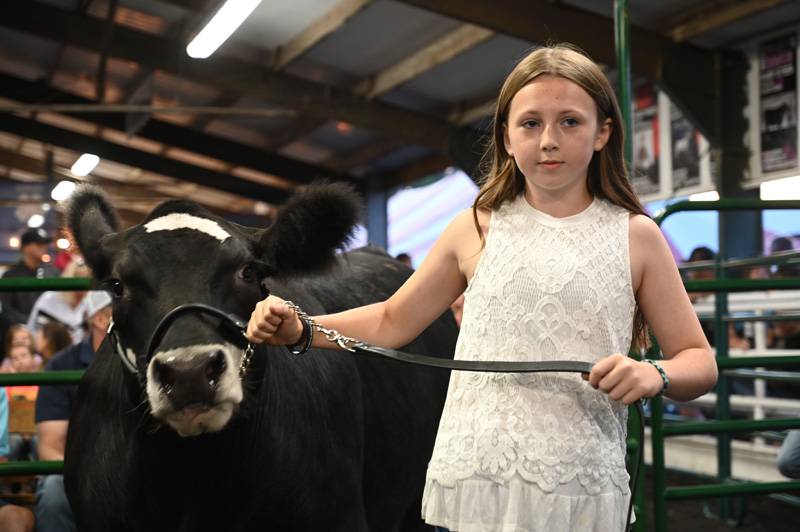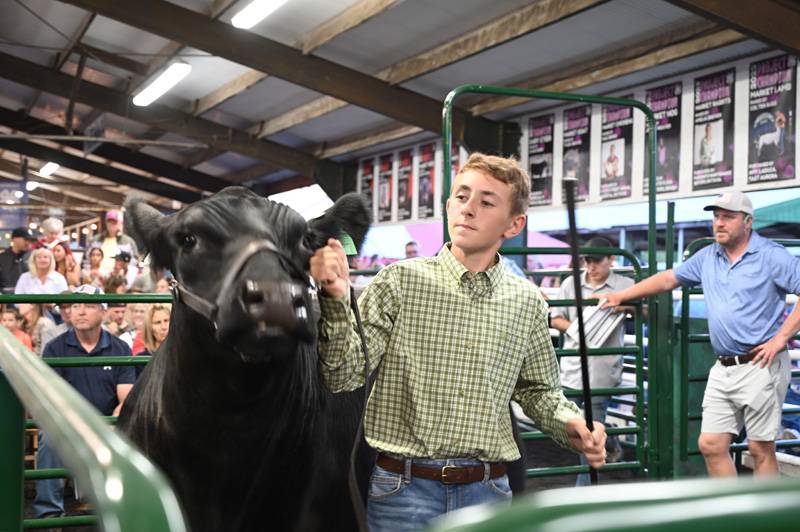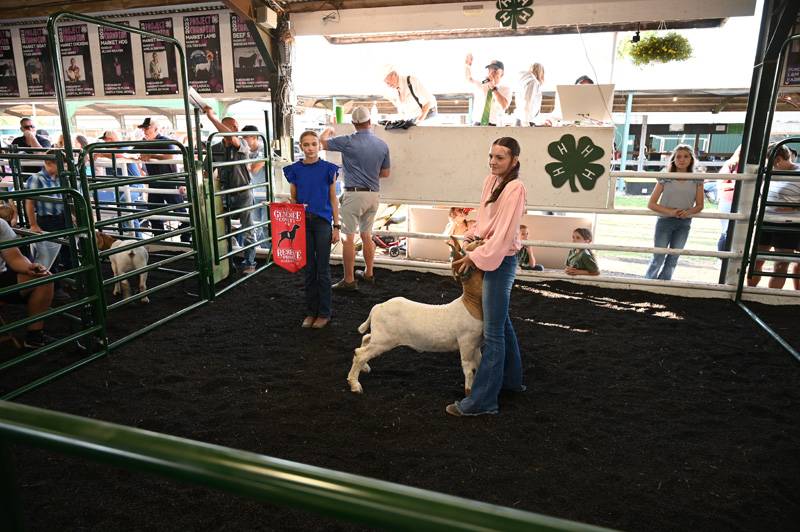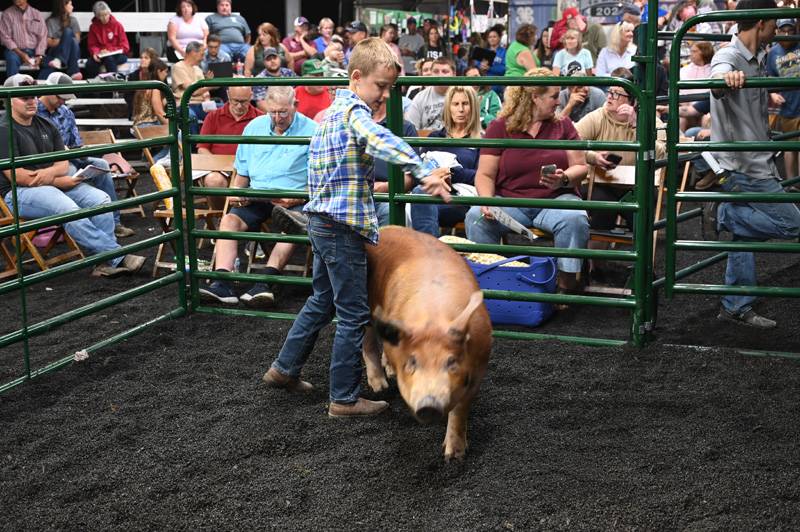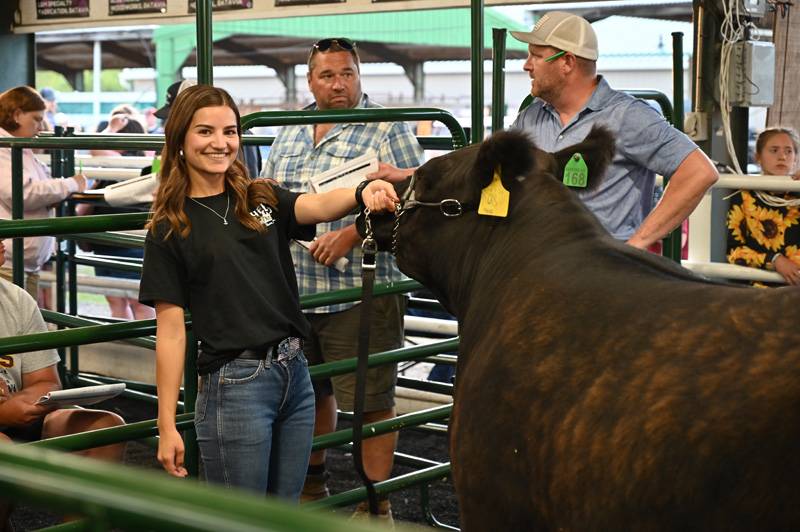
Photo by Debra Reilly.
Thursday was a bittersweet day for 4-H members at the Genesee County Fair because it featured the market animal auction—a successful fundraiser and culmination of so much hard work but also perhaps some unforgiving emotional investment.
There’s Chase Zuber of Byron, who raised Big Papi, named after his favorite Red Sox baseball player, David Ortiz, and “watched him grow from the soil” from a cute piglet to an enormous 288-pound oinker.
And Kaidan Hofheins of Batavia, there with her grown bovine, who she had just shown on Sunday and placed sixth overall, doing “pretty good,” she said.
“His name's Miko. I raised him at our house, actually. Usually, we all raise them on the fourth-generation farm back on Grandpa's, but I had a calf born at our house, so Grandpa let me use him this year. So it's been a little different,” she said just before the auction started at the Batavia fairgrounds. “But it's been really good. I've been able to bring him out to some other shows. I actually did really well. It's certainly an honor. I mean, to be in this program. It's taught me a lot. But it is a hard night; it's also one of my favorite nights, seeing how everyone just kind of comes together to support each other and the community we have.
“But I mean, it's hard knowing I've raised him since a calf. So it's hard to say goodbye and to let go,” she said. “But we were always taught it's a circle of life. It's okay. So it's hard, but it's good. It teaches you a lot of valuable lessons. So I'm really grateful for this program and everything I've learned.”
Tim Call, a longtime member of the farming community and owner of Empire Tractor in Batavia, has also been a supporter of 4-H and has participated in the auction. He has bid on animals that he shares with his company employees, he said.
This is an important program for what it teaches the kids beyond the basics of care, Call said.
“Teaching them how to grow, how to raise animals, how to understand economics, you know, you’ve got to pay, you get the money, you’ve got to pay for it all, and hopefully there's something there at the end. And you have to go out and market it, because you'll see, there are some kids, for a cow or a steer they'll get two bucks, other kids will get 10 bucks (per pound). Well, the guy that did 10 bucks went out and marketed it better; they asked more people to buy their animal as part of their learning process,” he said. “And when they see other people getting more money, the next year, they know how to go out and try to ask people to buy them.”
Some 4-Hers have regulars, such as Todd Jantzi, who comes to the auction to bid on his neighbor’s livestock to support her, he said.
“She has a great spirit and is a hardworking young lady,” Jantzi said. “It’s a great aspect of growing up in life being responsible for your animals, that those animals are needing her. And it just creates a tremendous amount of responsibility at a young age."
He appreciates the 4-H program, he said, and seeing the kids reap the benefits of hands-on labor and experiencing success from their efforts.
“It brings a warm feeling to my heart,” he said. “You like to see the smile on the kids and the reward for their hard work over the last, say, six months. So it’s a neat process.”
There were 227 animals in Thursday's auction. A sheet of Auction Terms & Conditions explains how it works, from how animals are sold—goats, lambs, steers, and hogs are sold whole, live by the pound versus market chickens and rabbits are sold in lots of two, with the chickens already processed and frozen—to pricing, making payment, selecting a processor, transporting the animal, and where proceeds go.
All but a 5% commission to Cornell Cooperative Extension for auction and program expenses goes back to the youth participants for their own programs.
Although the 4-H program focuses on caring for and showing animals, other aspects are involved, such as public speaking and marketing, said Cooperative Extension Executive Director Jocelyn Sikorski.
“It’s learning how to work as an individual, building a skill set on how to care for something, right? Learning how to make money and how to sell your product, they have to go through public speaking. There are many different layers of education with 4-H when it comes to youth development; it really hits on almost all of them,” she said. “And it’s cumulative throughout the course of the programs … so truly, this is our culminating event for most of the kids unless they go on to compete at State Fair.”
There are several other non-animal programs in 4-H, including Family and Consumer Sciences and Junior Master Gardener Club, she said.
“So there’s all different life lessons on whether it’s maintaining an animal for the health of the animal and for the betterment of the animal, to how to plant and grow your own food and how to make your own food, how to do all of those things are built through 4-H,” she said.
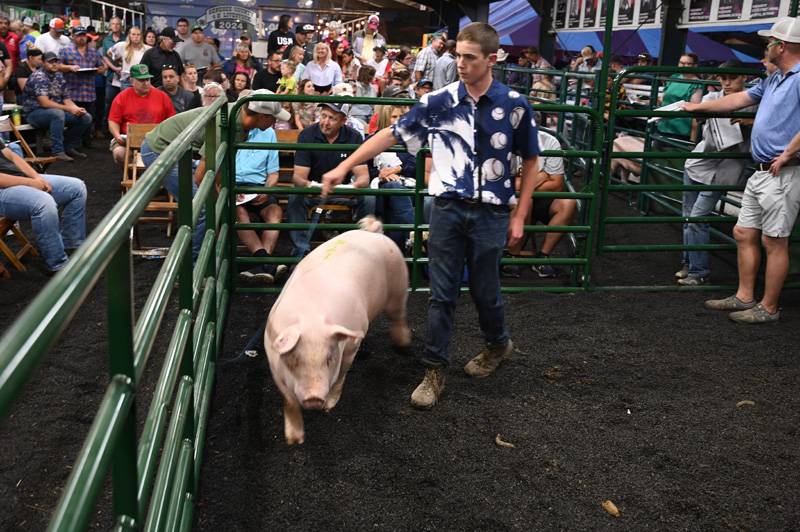
Photo by Debra Reilly
